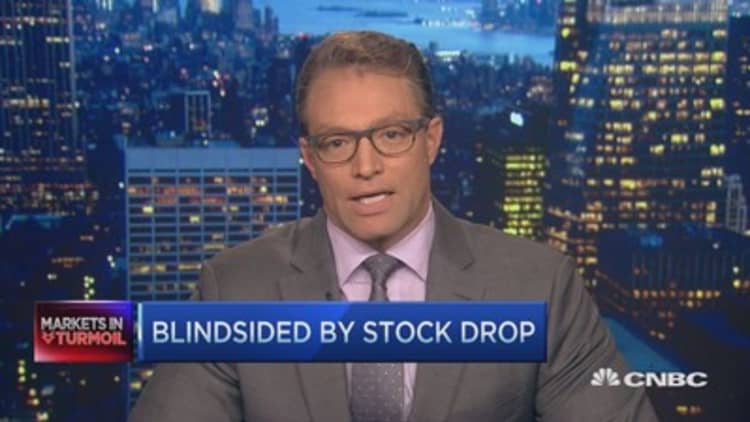
Investors have been left rattled after one of the most volatile summers in financial markets in living memory, thanks to fears of China's slowdown and speculation surrounding the timing of the Federal Reserve's first interest rate hike in six years. These jitters have even spread to the part of the investment community that doesn't normally concentrate on day-to-day movements -- High Net Worth Individuals.
From the summer peak to August low, global equities fell by around 12 percent, mostly in the week leading up to the "Black Monday" mini-crash on 24 August.
Many equity markets fell by 20 percent from their previous highs, putting them in official 'bear market' territory, with China leading the way. This month hasn't looked much better, with U.S. stocks seeing their worst start to September in 13 years and, even after the Fed held off on a rate rise, stocks still finished sharply lower last week.
High Net Worth investors, or individuals with at least $1 million in investable assets, tend to have less interest in the short term when it comes to putting their cash to work, but even they are feeling unnerved in the current volatile climate, analysts say.
CNBC takes a look at how the rich are coping.
Real estate remains core
Property has been a mainstay of high net worth investor portfolios for decades, as can be seen in the soaring prices in prime real estate in capitals around the globe. While data has showed that there has been some cooling in London property prices this year, real estate is still the wealthy investor's go-to safe haven.
Simon Smiles, global chief investment officer for the ultra-wealthy at UBS said three years ago, clients were mostly concerned with investing in U.S., real estate.
Now he is seeing more of a shift to Europe, but clients are still inquiring about real estate more than any other asset.
"Today it is not so much about the U.K., it is far more about continental Europe. Mid-sized clients are looking for deals in terms of offices and real estate. Our larger clients are looking for trophy assets, luxury hotels and hotel chains," Smiles, who deals with ultra-high net worth clients with investable assets of $30 million or more, told CNBC.
Smiles said there had been a sharp increase in the number of clients calling in light of recent market volatility, but that investors were mostly seeing the sell off as a buying opportunity.
"Interestingly, the conversations are often turning to the tactical or where the opportunities are, so people looking to deploy more capital, rather than taking that capital off the table," he said.
In its annual global report into "family offices" – which serve to manage wealth of very affluent individuals or families -- Campden Wealth and UBS found that there was a significant "home bias" when it comes to property investing, with the groups preferring investments closer to their base.
Some 224 family offices were questioned for the report, published on Wednesday, with an average of $806 million assets under management.
Read MoreThe rich are saving cash at a record pace
The data revealed an "ongoing affinity" among family offices for residential property in particular, with 42 percent of their real estate direct investment in the form of residential property.
Hedge funds were also an increasingly popular choice amongst family office portfolios, with the asset class seeing the single largest growth in allocations so far this year.
"This class has been given added appeal by the low interest rate environment and lackluster returns in equity generally," the report found, with family offices now putting 9 percent of their portfolios in hedge funds, which is "significantly more than high net worths generally".
Stocks over bonds
"In trying to preserve their real wealth, investors have to be vigilant on two fronts," said global investment strategist at Rothschild Wealth Management, which oversees 16 billion euros ($18 billion) in assets, with the average client worth around 5 million euros.
"Assets can be threatened from above, by falling markets; and, less visibly, from below, by inflation."
Gardiner suggests that for clients looking to hang on to their wealth long-term, equities are still the best solution and are a better bet than fixed income and traditional "hedges" such as gold.
"History is not infallible, but for the period for which we have credible data – effectively the last 90 to 100 years – long-term total returns from the big stock indices in the U.S. and U.K. have comfortably beaten inflation," Gardiner said in his monthly newsletter to clients
"For long-term investors, stocks' exposure to real growth gives them the edge in informally compensating for inflation – an attractive characteristic if it does eventually revive, and one of our reasons for favoring business ownership as a central plank in our strategy for preserving clients' real wealth over the long term," Gardiner added.



